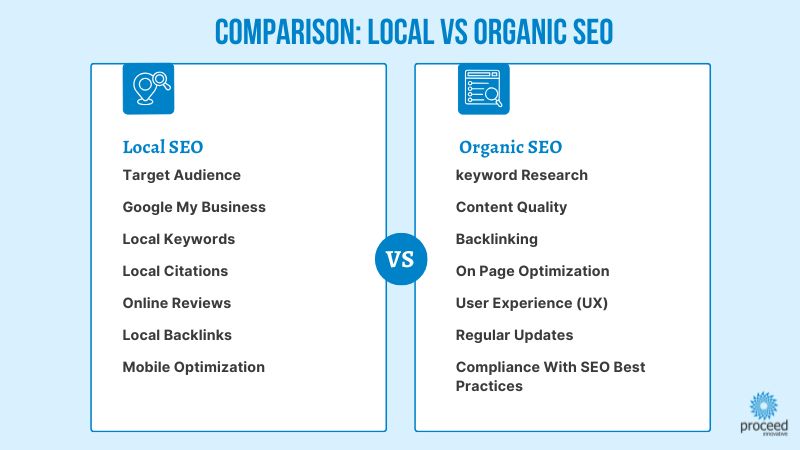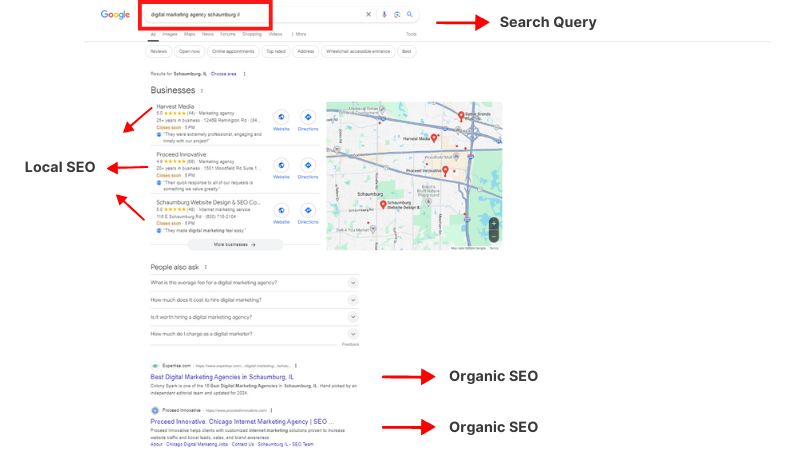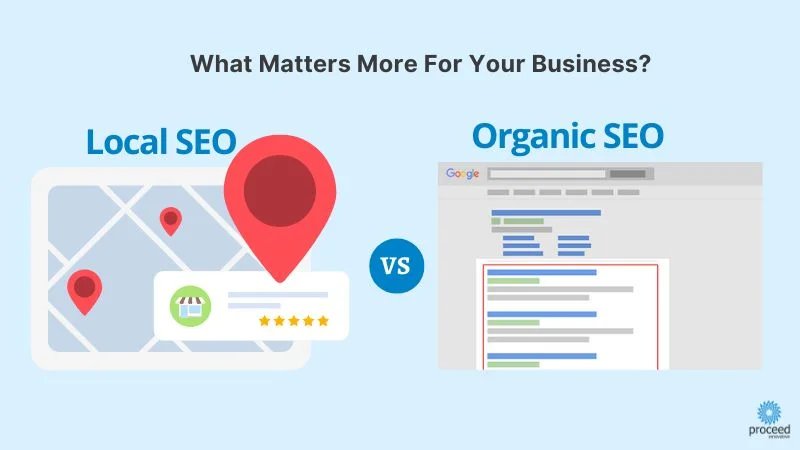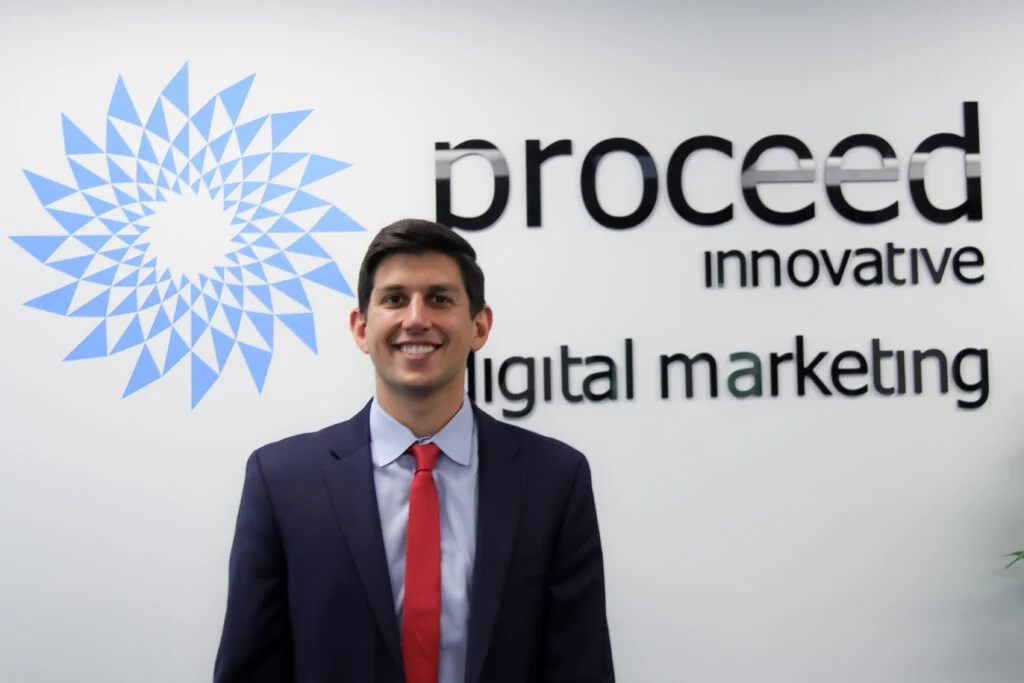The key to getting found online starts with a strong SEO strategy. When your website offers a great user experience, features valuable content, and is optimized with relevant keywords, it ranks higher in search engine results. This increased visibility leads to more website traffic, more qualified leads, and ultimately, more sales.
Two Core SEO Strategies: Organic SEO vs. Local SEO
There are two essential types of SEO that can significantly boost your online presence:
Organic SEO focuses on ranking in the main search results for relevant keywords.
Local SEO is designed to get your business listed in Google’s local 3-pack (the map section), which targets nearby customers actively searching for your services.
While each strategy has a different focus, combining organic and local SEO can significantly improve your online visibility, establish your credibility, and attract customers in your service area.
In this guide and video, we’ll break down the differences between organic and local SEO, share best practices, and highlight the unique benefits of both.
What Is Organic SEO?
Organic SEO helps your website rank in unpaid (organic) search results for queries that are relevant to your business. Over 50% of all website traffic comes from organic search, and the top 10 results account for about 99% of all clicks. That’s why it’s crucial to earn a spot at the top of search engine results pages (SERPs) for your key search terms.
Organic SEO Best Practices
🎯 Understand Your Target Audience
Start by identifying who your ideal customers are and what problems they’re trying to solve. Understanding their intent helps you create helpful, engaging content that speaks directly to their needs.
🔍 Smart Keyword Research
Use a mix of high-volume keywords and long-tail semantic keywords that reflect how people actually search. Consider variations, questions, and synonyms to broaden your reach without competing for overly saturated terms.
✍️ Create High-Quality, Helpful Content
Write content that is informative, easy to read, and genuinely helpful. Focus on answering user questions, solving pain points, and showcasing your expertise. Update older content regularly to keep it relevant.
🔗 Strengthen Internal and External Linking
Connect pages on your website through internal links to guide users and help search engines crawl your site more effectively. Earn backlinks from reputable sources to build your site’s authority.
🧱 Use Clear Page Structure
Break up content with proper headings (H1, H2, H3, etc.) to improve readability and help both users and search engines understand your content’s hierarchy and meaning.
⚡ Improve Site Speed and Performance
Fast-loading pages reduce bounce rates and improve user experience. Optimize images, reduce scripts, and ensure mobile responsiveness to meet Google’s performance standards.
The Takeaway
Organic SEO isn’t just about ranking for keywords—it’s about providing valuable information that aligns with what your audience is truly looking for. When paired with local SEO, it can dramatically increase your visibility in both local and national search results.
By following these best practices and creating content that’s human-first and search-friendly, your business will be well-positioned to grow its online presence and earn the trust of both customers and search engines.
Benefits of an Effective Organic SEO Strategy
Running a strong organic SEO campaign offers long-term advantages for your business. When done right, it helps attract the right audience, build trust, and drive measurable growth—without relying on paid ads. Here’s how:
🌐 Sustained Online Visibility
With higher rankings in search engine results, your business gains lasting visibility. Unlike paid ads that stop delivering traffic when the budget runs out, organic SEO helps your website stay visible over time.
🤝 Builds Trust and Credibility
Users trust Google, and when your website appears at the top of search results, it’s seen as more reputable and authoritative. A high organic ranking signals to users that your business is relevant and reliable.
💰 Cost-Effective in the Long Run
While there’s an upfront investment in content creation and optimization, organic traffic doesn’t come with a per-click cost. That means more ROI over time as your content continues to attract visitors without additional ad spend.
🚀 Enhances User Experience
To perform well in search, your website needs to load quickly, be mobile-friendly, and offer intuitive navigation. These SEO improvements naturally enhance the user experience, keeping visitors engaged and reducing bounce rates.
🎯 Brings in Qualified Traffic
Organic SEO targets users who are actively searching for your products or services. These visitors are already interested and more likely to convert into leads or customers, making your traffic more meaningful.
📊 Easy to Measure and Optimize
Organic SEO performance can be tracked using tools like Google Analytics and Google Search Console. These insights help you understand what’s working, identify opportunities, and refine your strategy for even better results.

What is Local SEO?
Local SEO is a branch of search engine optimization that focuses on helping businesses increase visibility in local search results. While it shares some similarities with organic SEO, local SEO specifically targets people searching for services within a geographic area—making it essential for brick-and-mortar businesses and service providers.
Did you know that 46% of all Google searches have local intent? Even more compelling: 28% of local searches result in a purchase. That means users searching for terms like “plumber near me” or “best Italian restaurant in [City]” are ready to act—and fast.
The Goal of Local SEO
The primary aim of local SEO is to help your business appear in Google’s Local 3-Pack—the map-based listing that shows up above the standard organic search results for location-specific queries. This prime real estate draws significant attention and clicks from users.
What Triggers Local Search Results?
Local search queries typically include:
City or neighborhood names (e.g., “dentist in Cumming GA”)
Keywords with geographic intent (e.g., “coffee shops nearby,” “restaurants near me”)
Mobile searches where the location is automatically detected by Google
When Google identifies local intent, it displays businesses that are most relevant to the searcher in the 3-Pack. Here’s how it decides which businesses to show:
Google’s Local Ranking Factors
✅ Relevance
How closely your business listing matches the searcher’s query. The more detailed and complete your business profile, the better your chances of being shown.
📍 Distance
How far each potential result is from the searcher’s location. Proximity plays a significant role, especially in “near me” searches.
⭐ Prominence
How well-known your business is—both online and offline. Google considers factors like:
Number and quality of reviews
Mentions across the web
Local citations
Website authority
Local SEO helps your business connect with nearby customers when they’re actively searching for your services. When optimized correctly, it brings in high-intent leads that are more likely to convert—making it a powerful strategy for local growth.
Local SEO Best Practices to Boost Your Local 3-Pack Rankings
If you want your business to appear in Google’s coveted local 3-pack, optimizing for local SEO is essential. Here are the most effective steps to help you stand out in local search results and attract nearby customers:
1. Claim and Optimize Your Google Business Profile
Google Business Profiles are the foundation of local SEO. They’re free, and they directly feed into the local 3-pack results.
What to do:
Claim your listing for every physical location
Add accurate business details, including name, address, phone number, website, and hours
Upload high-quality photos of your storefront, products, and team
Use relevant categories and attributes
Add your services and FAQs for better visibility
Pro Tip: Keep your profile active by posting updates, responding to reviews, and answering questions.
2. Build Out Local Citations
In addition to Google, list your business on other trustworthy platforms like Yelp, Apple Maps, Bing Places, and industry-specific directories.
Why it matters:
The more consistent your online presence is across platforms, the more trust Google places in your business.
3. Ensure NAP Consistency
NAP stands for Name, Address, and Phone number—and it must be identical across all listings. Even small inconsistencies can hurt your rankings.
Include:
Accurate hours of operation
Real-time updates for holidays or special closings
The same format (e.g., “St.” vs “Street”) across all listings
4. Add High-Quality Photos
Photos play a big role in engagement. Listings with appealing images often get more clicks.
What to include:
Exterior and interior shots of your business
Product or service images
Staff photos (friendly faces build trust)
Behind-the-scenes or “day in the life” shots
5. Optimize for Mobile
Since many local searches happen on-the-go, your website and listings must be mobile-friendly.
Make sure:
Pages load quickly
Navigation is simple
Click-to-call buttons are enabled
Contact and location info is easy to find
6. Use Localized Keywords
Incorporate geo-specific keywords into your content, metadata, and image alt tags. Think:
City and neighborhood names
Local landmarks or nicknames
“Near me” phrasing (e.g., “auto repair near downtown Denver”)
7. Manage Your Online Reputation
Reviews are a major factor in local SEO rankings. Businesses with more positive, recent reviews are seen as more trustworthy.
Best practices:
Respond to every review—positive and negative
Encourage happy customers to leave reviews
Stay calm and professional when handling criticism
8. Create Local Landing Pages
If you serve multiple locations, create a dedicated landing page for each area. These pages should be rich with local information and optimized with keywords specific to that location.
Include on each page:
Contact details
Operating hours
Local photos or testimonials
Service areas and directions
Embedded Google Maps
9. Leverage Social Media for Local Reach
Your social media profiles can act as local business listings. Be sure they include:
Accurate business information (NAP, hours, etc.)
Up-to-date images
Regular updates and promotions
Bonus tip: Engage with your local audience through stories, reels, or community-focused posts.
By following these local SEO best practices, you not only improve your chances of appearing in the local 3-pack, but you also create a stronger digital presence that connects with real people in your community—when they’re ready to take action.
Key Benefits of an Effective Local SEO Strategy
A well-executed local SEO strategy doesn’t just improve search rankings—it connects your business with real customers who are ready to take action. Whether you’re a storefront, service provider, or multi-location business, here’s what you can expect:
✅ Increased Local Visibility
Local SEO helps your business appear in local search results and on map listings, making it easier for customers in your area to discover you—right when they need your services.
✅ Reach High-Intent, Local Customers
Local SEO targets people actively searching in your geographic area. These searchers often have immediate needs and are more likely to convert than general web traffic.
✅ Boost Foot Traffic to Your Location
Appearing in Google’s local 3-pack and on Maps can drive more people to your physical storefront or office. Better visibility means more walk-ins and in-person opportunities.
✅ More Conversions
Local searchers tend to be action-oriented. Whether it’s scheduling a service or visiting your store, they’re closer to making a decision—making local SEO a powerful tool for increasing sales and leads.
✅ Build Trust and Credibility
Positive reviews, consistent business info, and strong local presence all contribute to your brand’s credibility. When customers trust your business, they’re more likely to choose you—and recommend you to others.
✅Cost-Effective Growth
Compared to paid ads, local SEO offers long-term value without ongoing ad spend. With the right optimization, your business can maintain high local visibility over time at a lower cost.

Is Organic SEO or Local SEO Better for My Business?
The truth is—you don’t have to choose between organic SEO and local SEO. These strategies are not in competition; they work best together.
A strong organic SEO strategy helps your website rank in the main search results, improves brand visibility, and builds credibility across a broad audience. It’s essential for any business that wants to be found online.
Meanwhile, local SEO is ideal for businesses that serve a specific geographic area or rely on foot traffic—such as restaurants, clinics, law offices, or service-based businesses. Local SEO tools helps you show up in Google’s local 3-pack, Maps, and “near me” searches, increasing your visibility to nearby customers who are ready to take action.
When combined, organic and local SEO create a powerful, well-rounded online presence that drives both general and location-specific traffic—resulting in more leads, trust, and conversions.
Key Takeaways:
Organic SEO improves your visibility in standard search results and builds long-term trust and authority.
Local SEO boosts your presence in map listings and location-based searches to attract nearby customers.
Together, they enhance your digital footprint, increase relevant traffic, and help you reach both broad and local audiences.
Businesses of all types should invest in organic SEO, and those with a local service area should pair it with local SEO for maximum impact.
Why Choose Proceed Innovative for Your SEO Success
Achieving lasting results with SEO takes time, strategy, and expertise. At Proceed Innovative, we take the complexity off your plate—helping you strengthen your online presence, reach the right audience, and turn traffic into measurable business growth.
Whether your goal is to improve your visibility in national search results through organic SEO or attract more local customers with a targeted local SEO strategy, our team is here to guide and support you every step of the way.
Partner with Proceed Innovative and take the guesswork out of SEO—so you can focus on running your business while we focus on getting you found.

Contact Proceed Innovative or call us at (800) 933-2402 to learn more about how our experts can help boost your online presence with effective SEO marketing.






